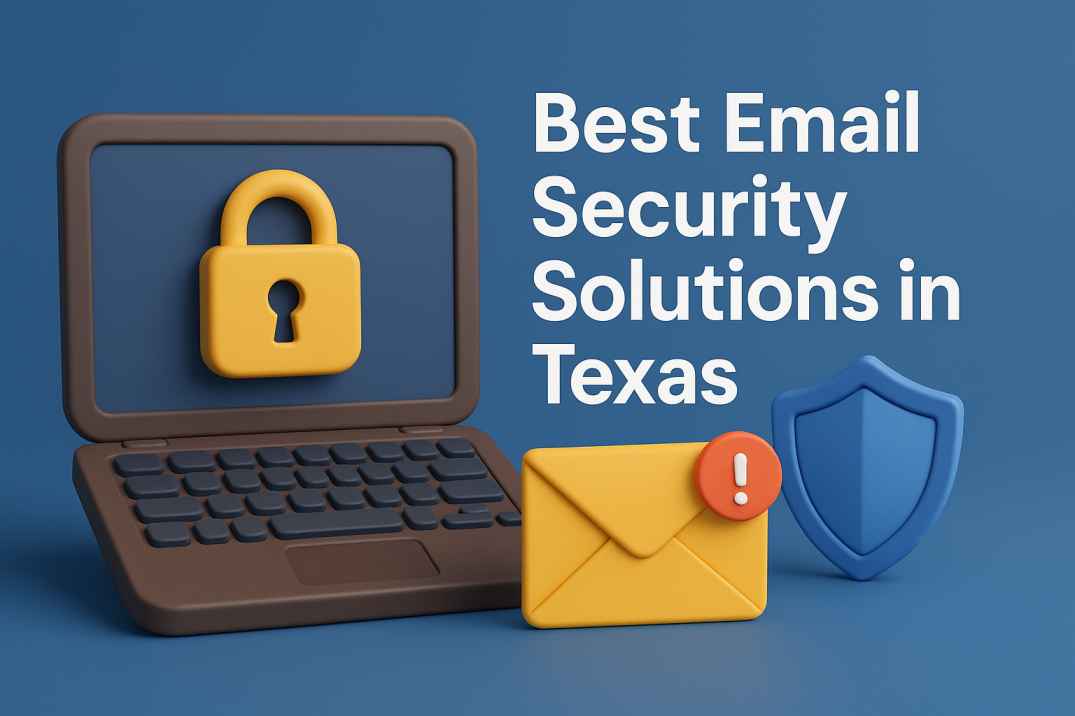Best Email Security Solutions Companies in Texas | Secure Your Business

Why Email Security Matters for Texas Businesses
In today’s digital landscape, email remains the primary communication medium for businesses across Texas. However, it is also the primary attack vector for cybercriminals. The importance of implementing Best Email Security Platforms cannot be overstated, especially in a state like Texas where diverse industries—from oil and gas to finance and technology—handle sensitive and proprietary information daily.
Firstly, the increasing sophistication of email-borne threats, such as phishing, ransomware, and business email compromise (BEC), has compelled organizations to prioritize robust Email Security Services & Solutions. Consequently, understanding the available options and choosing the Best email security solutions for Texas has become critical for operational resilience and data protection.
This comprehensive guide explores leading Email Security Platforms, compares solutions tailored for Texas businesses, and helps organizations choose between free and paid options to secure their digital communications.
Source: Cybersecurity & Infrastructure Security Agency (CISA)
Understanding the Threat Landscape in Texas
Texas, as one of the largest economies in the United States, presents a lucrative target for cybercriminals. Businesses in the region face a unique blend of threats, including:
Phishing and Spear-Phishing Attacks: Designed to trick employees into revealing credentials.
Business Email Compromise (BEC): Financially motivated attacks targeting executives or financial departments.
Ransomware via Email: Malicious attachments or links encrypting critical business data.
Data Leakage Risks: Sensitive business information leaving secure networks via email channels.
According to the FBI’s Internet Crime Report, Texas reported over $370 million in business losses due to email-related cybercrimes in 2023 alone.
Consequently, investing in the Best Email Security Solutions Compared is no longer optional—it’s a necessity for survival and competitive advantage.
Best Email Security Platforms: An Overview
Selecting the right platform can be overwhelming, given the plethora of options. The Best Email Security Platforms share certain characteristics:
Advanced Threat Protection
Machine Learning Algorithms
URL Filtering and Link Protection
Data Loss Prevention (DLP)
Encryption Services
Cloud Integration
Seamless User Experience
Some industry-leading platforms include:
Proofpoint: Renowned for advanced threat intelligence and BEC protection.
Mimecast: Popular for its layered security and business continuity.
Barracuda Networks: Affordable and efficient, favored by mid-sized businesses.
Microsoft Defender for Office 365: Integrated security for Microsoft 365 users.
Cisco Secure Email: Powerful for enterprises needing scalable protection.
These Email Security Services & Solutions cater to organizations of varying sizes and industries, ensuring that Texas businesses can find a platform suited to their specific risk profile.
Key Features to Look for in Email Security Services & Solutions
When evaluating Best Email Security Platforms, Texas businesses should prioritize the following key features:
1. Threat Detection and Prevention
Firstly, a robust platform should block threats before they reach user inboxes. Look for AI-powered analysis and sandboxing capabilities.
2. Advanced Phishing Protection
Given the prevalence of targeted phishing in Texas industries, platforms must detect suspicious links, compromised senders, and social engineering tactics.
3. Data Loss Prevention (DLP)
Regulations like HIPAA and GDPR mean sensitive data must stay protected. DLP tools prevent unauthorized sharing of confidential information.
4. Encryption
To comply with legal standards and ensure confidentiality, modern solutions should offer end-to-end encryption for sensitive emails.
5. Seamless Integration
Email security should integrate with cloud services such as Microsoft 365, Google Workspace, or on-premises systems without performance issues.
6. User Education
Solutions that include training modules for employees can drastically reduce human error, a significant vulnerability in email security.
Best Email Security Solutions Compared: Texas Edition
Let’s compare some Best Email Security Solutions for Texas, analyzing their key features and suitability:
Each solution offers unique benefits, and the Best email security solutions for Texas free may suffice for smaller businesses but lack enterprise-grade capabilities.
Compare top providers on Gartner Magic Quadrant
How to Choose the Best Email Security Solutions for Texas
Choosing the right solution requires evaluating:
Business Size and Industry: Healthcare firms have different compliance requirements than oil & gas.
Budget: Free solutions offer basic protection but may lack advanced threat defense.
Integration Needs: Does the platform work seamlessly with existing infrastructure?
Support and Maintenance: Consider vendors offering 24/7 support and rapid incident response.
Compliance Requirements: HIPAA, SOX, PCI DSS compliance are crucial for regulated industries.
Consequently, Texas businesses should align choices with risk tolerance and regulatory demands to avoid costly breaches.
Benefits of Using Specialized Email Security Platforms in Texas
Organizations adopting the Best Email Security Platforms enjoy numerous advantages:
Enhanced protection against sophisticated attacks.
Reduced risk of financial loss due to fraud.
Improved compliance posture.
Greater employee awareness through integrated training.
Business continuity during cyber incidents.
Therefore, investing in top-tier Email Security Services & Solutions is a strategic decision that safeguards reputation and client trust.
Best Email Security Solutions for Texas Free vs Paid Options
While there are Best email security solutions for Texas free options available, businesses should weigh their limitations:
Free Solutions:
Basic spam filtering
Minimal malware protection
No advanced phishing detection
Limited support
Paid Solutions:
Comprehensive threat protection
Encryption and DLP
Detailed reporting and analytics
24/7 support
Firstly, free solutions suit startups or personal use. However, for businesses handling sensitive data, paid solutions deliver far superior protection and compliance capabilities.
Top Email Security Solutions Companies Based in Texas
Texas hosts several prominent Email Security Solutions Companies, such as:
Trend Micro (Austin, TX): Global cybersecurity leader offering cloud-based email protection.
Armor (Richardson, TX): Provides security services including email threat management.
Forcepoint (Austin, TX): Specialized in data security and email protection.
Alert Logic (Houston, TX): Offers threat detection and response, including email security monitoring.
These companies contribute significantly to the cybersecurity landscape and often tailor services specifically for Texan businesses.
Source: Texas Cybersecurity Council
Emerging Trends in Email Security for Texas Businesses
Cyber threats continue evolving. Emerging trends include:
AI-Driven Detection: Machine learning for zero-day threat identification.
Cloud-Native Security: Tailored solutions for hybrid work environments.
Integrated Zero Trust Models: Treating every email as potentially malicious.
Automated Incident Response: Faster containment of breaches.
Phishing Simulation Training: Proactive employee education.
Consequently, staying ahead of these trends ensures businesses remain resilient against sophisticated attacks.
Which is the Best Email Security Solution?
Selecting the best email security solution depends greatly on an organization’s size, industry, regulatory environment, and specific security challenges. However, certain solutions consistently rank among the best due to their advanced features, reliability, and market reputation.
One standout is Proofpoint, widely regarded as one of the top email security providers globally. Proofpoint offers comprehensive protection against advanced threats such as phishing, ransomware, business email compromise (BEC), and credential theft. Its platform uses machine learning and advanced analytics to detect sophisticated attacks that traditional filters often miss. Organizations particularly value Proofpoint’s granular policy controls, detailed reporting, and strong capabilities in protecting high-risk users like executives who are frequent targets for spear-phishing.
Another leader in this field is Mimecast. Mimecast’s Email Security with Targeted Threat Protection provides multi-layered defense mechanisms, including URL scanning, attachment sandboxing, and impersonation protection. Mimecast stands out for its user-friendly interface and seamless integration with Microsoft 365, a crucial factor for businesses heavily invested in Microsoft’s ecosystem. It also offers email continuity services, ensuring email operations remain unaffected during service outages—a significant benefit for business resilience.
Cisco Secure Email (formerly Cisco Email Security) is another exceptional solution, offering robust defenses for enterprise-scale environments. Cisco uses advanced threat intelligence from Talos, one of the largest commercial threat intelligence teams globally. Its platform excels in detecting and blocking threats in real-time, and it integrates well into broader network security architectures, making it ideal for organizations seeking unified security management across multiple vectors.
For businesses seeking a cost-effective option without sacrificing quality, Barracuda Networks offers strong capabilities. Barracuda’s email security solution provides effective spam filtering, malware protection, and phishing defense, with easy deployment and administration. Small to mid-sized businesses, in particular, appreciate Barracuda’s balance of robust features and affordability.
Meanwhile, Microsoft Defender for Office 365 has become a popular choice for organizations utilizing Microsoft 365. As a native solution, it integrates seamlessly into Microsoft environments and offers sophisticated protection against phishing, malware, and business email compromise. Its real-time detection capabilities and automated incident response features make it a strong contender for businesses looking to simplify security management.
When determining the best email security solution, several key factors should guide your decision:
Threat Protection: Does the solution effectively stop modern threats like spear-phishing, ransomware, and zero-day attacks?
Integration: How well does it integrate with existing infrastructure such as Microsoft 365, Google Workspace, or hybrid environments?
Ease of Use: Is the solution user-friendly for IT administrators and end-users alike?
Compliance: Does it support regulatory requirements relevant to your industry (e.g., HIPAA, GDPR)?
Scalability: Can it grow with your business needs?
Support and Reliability: Does the vendor offer strong customer support and high service uptime?
Ultimately, the best email security solution for one business may not be ideal for another. Therefore, organizations should conduct a thorough risk assessment, evaluate solutions through trials or demos, and consider seeking expert guidance to ensure they choose a platform that aligns with their specific security requirements.
In conclusion, while providers like Proofpoint, Mimecast, Cisco, Barracuda, and Microsoft Defender consistently earn high praise, the best choice depends on your unique business context, budget, and operational priorities.
What is the Most Secure Email Service in the US?
In an age of relentless cyberattacks, data breaches, and growing privacy concerns, choosing a secure email service has become vital for individuals and organizations alike. While there are numerous providers worldwide, several email services stand out in the United States for their robust security features, privacy protections, and commitment to safeguarding user data.
ProtonMail (U.S.-Focused Service Availability)
Although based in Switzerland, ProtonMail is widely used in the U.S. due to its exceptional security measures and privacy laws rooted in Swiss jurisdiction. ProtonMail offers end-to-end encryption, meaning only the sender and recipient can read the message contents—even ProtonMail’s servers cannot access them. It also offers features such as self-destructing messages, two-factor authentication, and zero-access encryption for maximum privacy.
While ProtonMail is technically European, its service infrastructure and customer base are heavily global, including the United States. For users prioritizing privacy and security above all else, ProtonMail remains a highly respected choice.
Tutanota
Tutanota, another popular service with a significant U.S. user base, provides end-to-end encrypted email and even encrypts subject lines and address book data—a feature not always offered by competitors. Its open-source platform allows for transparency and public scrutiny of its security measures. Tutanota also refrains from displaying ads, enhancing both user experience and privacy.
Hushmail
Based in Canada but serving a strong U.S. clientele, Hushmail offers encrypted email solutions tailored to business and personal use. It’s especially popular among healthcare professionals in the United States because it provides HIPAA-compliant services, making it suitable for handling sensitive patient data. Hushmail offers web-based encryption and compatibility with popular email clients through secure IMAP connections.
StartMail
Developed by the team behind Startpage, StartMail offers a private email solution focused on user privacy and security. Though based in the Netherlands, StartMail serves U.S. users seeking alternatives to mainstream services. It offers strong encryption, disposable aliases, and a strict no-ads policy.
ProtonMail vs. U.S.-Based Providers
While many top secure email providers are headquartered outside the United States, there are reasons some users seek U.S.-based options. Domestic services can be subject to American privacy laws and regulatory requirements, which may simplify legal compliance for U.S.-based businesses.
Among purely U.S.-based providers:
CounterMail
While CounterMail maintains servers in Sweden, it also operates infrastructure for U.S. customers. It’s known for hardware security modules and diskless servers, ensuring data isn’t written to physical disks, reducing the risk of physical data theft.
Zoho Mail (Enterprise-Focused)
Zoho Mail, while globally operated, has data centers in the U.S. and offers robust security for businesses, including S/MIME encryption, two-factor authentication, and enterprise-grade security protocols. However, it’s primarily an enterprise service and may be less suitable for purely personal secure email needs.
The Verdict
So, what is the most secure email service in the U.S.?
For individuals focused on privacy and encrypted communication, ProtonMail remains a leading choice despite being Swiss-based.
For businesses, particularly those needing HIPAA compliance, Hushmail is highly reputable.
For privacy-focused users wanting domestic options, Zoho Mail offers enterprise-grade security with U.S.-based infrastructure.
Ultimately, the most secure email service depends on your unique needs—whether that’s strict privacy laws, compliance requirements, user-friendliness, or advanced encryption technologies. Whichever provider you choose, ensure it offers end-to-end encryption, robust account protection like two-factor authentication, and a transparent privacy policy to safeguard your digital communications.
What is the Best Email Account for Security?
In today’s digital era, email remains an essential communication tool for individuals and organizations alike. Yet it also poses significant security and privacy risks. Phishing, malware, data breaches, and government surveillance have all driven demand for email services that prioritize security above all else. So, what is the best email account for security? The answer depends on your specific needs, but several services consistently stand out for offering superior protection and privacy.
Key Features of a Secure Email Account
Before identifying the best providers, it’s crucial to understand what makes an email account secure. The following features are essential:
End-to-End Encryption: Ensures only you and your recipient can read your messages, preventing service providers, hackers, or governments from accessing your content.
Zero-Knowledge Architecture: The service itself cannot decrypt or read your emails, even if compelled legally.
Two-Factor Authentication (2FA): Adds a layer of security beyond just a password.
Open-Source Code: Allows independent security audits, improving trustworthiness.
Data Privacy Policies: Transparent handling of user data with minimal logging.
Consequently, a secure email account should combine technical defenses with a strong privacy ethos.
Leading Secure Email Services
ProtonMail
ProtonMail, based in Switzerland, is widely regarded as one of the best secure email providers in the world. It offers end-to-end encryption, zero-access architecture, and stores data under the protection of Swiss privacy laws. ProtonMail does not require personal information to sign up, allowing users to remain anonymous.
Key highlights:
End-to-end encryption for emails between ProtonMail users.
Self-destructing emails for added privacy.
Open-source cryptographic algorithms.
User-friendly interface, both web and mobile.
For personal and professional users who prioritize privacy and anonymity, ProtonMail is a top choice.
Tutanota
Another standout service is Tutanota, a German-based provider offering end-to-end encryption not only for email contents but also for subject lines and contact lists—a feature many competitors lack. Tutanota is open-source and doesn’t rely on third-party tools like PGP, developing its own encryption technology.
Key features include:
Encrypted calendar integrated with the mail service.
No advertising, even in free accounts.
Minimal metadata storage.
Affordable premium plans for businesses.
Therefore, Tutanota is ideal for privacy-conscious users who prefer transparency and independent encryption solutions.
Hushmail
For businesses—especially those needing compliance with regulations like HIPAA—Hushmail remains a solid choice. Hushmail offers encrypted webmail and secure forms, making it especially useful for healthcare providers and legal professionals.
Benefits include:
HIPAA compliance for handling sensitive medical data.
Built-in encryption tools for web forms.
Decades of experience in secure email.
Although less modern in interface design, Hushmail’s reliability and compliance support make it a trusted option.
Mailfence
Mailfence, based in Belgium, provides end-to-end encryption and digital signing options, leveraging OpenPGP for security. It also includes calendar, contacts, and secure document storage within its ecosystem.
Notable features:
Digital signatures to verify sender authenticity.
Ability to exchange encrypted messages with non-Mailfence users.
No ads, even in free versions.
Mailfence is suitable for users who want robust cryptographic security integrated with practical email functions.
Choosing the Best Email Account for You
Ultimately, the best email account for security depends on individual priorities:
For maximum privacy and Swiss data protection laws, choose ProtonMail.
For innovative encryption and open-source transparency, consider Tutanota.
For regulatory compliance (e.g., HIPAA), Hushmail is an excellent fit.
For PGP integration and digital signing, Mailfence stands out.
Therefore, users should evaluate their needs—whether for personal privacy, business security, or regulatory compliance—to select the provider offering the right balance of features, usability, and peace of mind.
In an era where digital threats continue to evolve, investing in a secure email account is not just wise—it’s essential.
What is Proofpoint Email Security?
Proofpoint Email Security is a cloud-based cybersecurity solution designed to protect organizations against the growing risks associated with email communication. Recognized as one of the leading providers in the field of email threat protection, Proofpoint helps organizations defend against advanced threats such as phishing, malware, ransomware, business email compromise (BEC), and spam, while also assisting with data loss prevention (DLP) and regulatory compliance.
Overview and Core Purpose
Email continues to be the most commonly exploited channel for cyberattacks. Proofpoint's platform was built with the understanding that email threats are increasingly targeted and socially engineered, making them difficult for traditional filters to catch. Proofpoint provides advanced threat intelligence and behavioral analysis to block malicious content before it reaches the end user.
It offers protection for cloud-based platforms like Microsoft 365 and Google Workspace, as well as traditional on-premise email systems.
Key Features of Proofpoint Email Security
1. Advanced Threat Protection (ATP)
Proofpoint uses machine learning and threat intelligence to identify malicious URLs, attachments, and suspicious senders. This real-time scanning capability helps detect ransomware, zero-day threats, and credential phishing campaigns.
2. Business Email Compromise (BEC) Protection
One of Proofpoint’s strongest features is its ability to detect BEC—attacks where a malicious actor impersonates a trusted contact (like a CEO or vendor) to trick employees into sending money or sensitive information.
3. Email Encryption
It offers robust email encryption, helping companies meet data protection regulations like GDPR, HIPAA, and SOX. The encryption is policy-based and automatic, requiring minimal user intervention.
4. Data Loss Prevention (DLP)
To prevent the unauthorized transmission of sensitive data, Proofpoint includes customizable DLP rules. These are critical for industries handling regulated information (e.g., healthcare, finance, legal).
5. Security Awareness Training
Beyond technology, Proofpoint also offers security training tools that help employees recognize and respond appropriately to email threats.
Why Organizations Choose Proofpoint
Proofpoint stands out for its people-centric approach to security. Rather than focusing solely on networks or endpoints, it prioritizes protecting individuals within an organization who are most likely to be targeted. This risk-based approach helps IT teams identify “Very Attacked People” (VAPs) and apply extra layers of protection accordingly.
Many large enterprises, educational institutions, healthcare providers, and government agencies rely on Proofpoint due to its scalability, depth of analytics, and enterprise-level support.
What are the Three Types of Email Security?
Email security refers to the techniques and tools used to protect email accounts, content, and communications against unauthorized access, data breaches, phishing, and other cyber threats. As email remains a dominant form of business communication, protecting it is essential for organizational and personal security. There are three primary types of email security, each addressing different aspects of the email threat landscape:
1. Email Gateway Security
Email gateway security is the first line of defense and operates at the perimeter of an organization’s email infrastructure. It filters inbound and outbound email traffic to block threats before they reach the inbox.
Key Functions:
Spam Filtering: Blocks unsolicited messages.
Malware Detection: Scans for malicious attachments and URLs.
Phishing Protection: Identifies spoofed addresses and fraudulent messages.
Content Filtering: Enforces policies regarding email attachments and keywords.
Tools:
Popular solutions include Proofpoint, Mimecast, Cisco Secure Email, and Barracuda. These tools are commonly deployed as cloud-based or on-premise services.
2. Endpoint and User-Level Email Security
While gateways act as the first filter, endpoint security ensures protection continues at the user's device. It includes tools and configurations on computers, smartphones, and other devices to safeguard against email threats that bypass gateway filters.
Key Functions:
Antivirus and Anti-malware: Installed locally to detect and block threats in real time.
Email Client Security: Helps block scripts or macros in email apps.
User Awareness Training: Educates employees about phishing, social engineering, and safe practices.
Why It’s Important:
Attackers often rely on human error. Socially engineered attacks like business email compromise (BEC) or spear phishing bypass traditional filters by using convincing language and impersonation. Therefore, educating users and securing endpoints is critical.
3. Email Encryption and Data Loss Prevention (DLP)
This layer focuses on protecting the content of email communication—both in transit and at rest.
Email Encryption:
Encryption ensures that only the intended recipient can read the contents of an email. It’s especially crucial for protecting sensitive or regulated data (e.g., health records, financial data).
S/MIME and PGP are commonly used encryption protocols.
Services like ProtonMail, Hushmail, and Virtru offer easy-to-use encrypted email.
Data Loss Prevention (DLP):
DLP policies monitor outgoing emails to detect and prevent the unauthorized transmission of sensitive data, such as credit card numbers or patient information. Organizations in healthcare, finance, and education rely heavily on DLP for regulatory compliance.
Case Studies: Texas Companies Securing Their Emails Successfully
Case Study 1: Energy Sector
An oil & gas company in Houston adopted Mimecast, reducing phishing attacks by 80%. Their IT director noted that the transition prevented potential multi-million-dollar fraud attempts.
Case Study 2: Healthcare Sector
A medical network in Dallas deployed Proofpoint for HIPAA compliance, enabling real-time threat analysis and ensuring patient data privacy.
Case Study 3: Financial Services
A bank in Austin implemented Barracuda Networks, citing cost-efficiency and ease of integration as significant benefits.
These examples highlight that Best Email Security Platforms are not optional—they are strategic investments for Texas enterprises.
In conclusion, businesses across Texas must proactively safeguard digital communications. Whether you’re evaluating Best Email Security Platforms, exploring Email Security Services & Solutions, or comparing free vs. paid options, the stakes have never been higher.
Therefore, take action today:
✅ Evaluate your current email security posture.
✅ Compare providers to find the best fit.
✅ Implement training programs to reduce human error.
Protect your business with the Best Email Security Solutions for Texas and stay ahead of evolving cyber threats.
→ Ready to enhance your security posture? Discover leading providers and compare solutions now!
Powered by Froala Editor
You May Also Like

मुंबई में सबसे बड़े इंडिया इंटरनेशनल ज्वैलरी शो के 41वें संस्करण का उद्घाटन

आमिर खान की तारीफ़ सुनकर भावनाओं में बह गए टाइगर श्रॉफ

4 अगस्त को प्रारंभिक सार्वजनिक निर्गम खोलेगी पार्थ इलेक्ट्रिकल्स एंड इंजीनियरिंग लिमिटेड

ऑस्कर-योग्य ‘शेमलेस’ की टीम की वापसी

मानुषी छिल्लर का साड़ी और सनग्लासेस लुक बना मॉडर्न फैशन स्टेटमेंट

